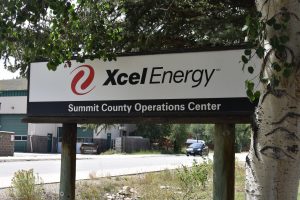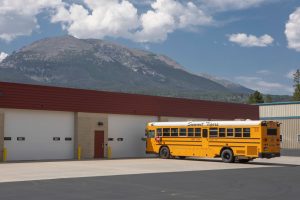‘This settlement is not good’: Residents express concern about what local officials didn’t advocate for in recent Xcel Energy agreement

Kit Geary/Summit Daily News archive
Summit County officials recently succeeded in leading an effort to ensure more consumer protections, particularly financial ones, in Xcel Energy’s project set to change the region’s natural gas system.
After reading the July 29 agreement between Xcel Energy and Summit County entities, some residents want to send it back to the drawing board.
Xcel Energy’s Mountain Energy Project aims to address gas supply constraints at the Marshall Compressor Station’s gas supply in Boulder County, which feeds natural gas to the Eastern Mountain Gas System running through Summit, Grand, Lake and Eagle counties. The estimated $155-million project includes nearly $50 million in non-pipeline alternatives as Xcel works to become a net-zero energy provider by 2050.
The settlement agreement is between Xcel Energy and parties who formally intervened in the Mountain Energy Project’s review at the Colorado Public Utilities Commission. Summit County and its municipal government, operating jointly as the Mountain Community Coalition, intervened for the sake of its constituent’s interests.
A pillar of the settlement agreement, which still needs approval from the state, was a guarantee from Xcel Energy that the $155 million price tag wouldn’t squarely fall on Eastern Mountain Gas System customers.
A request for a shift in focus
Some residents feel Eastern Mountain Gas System customers bearing the full price tag of the project should have never even been a consideration. Residents expressed similar feelings about an aspect of the settlement that asks Xcel to create winter-specific heat pump rates.
Residents’ remaining concerns involve the continued usage of natural gas. While the project looks to support a shift away from natural gas, which aligns with sustainability efforts in Summit County, the use of natural gas is not absent from Xcel’s proposal. Specifically for Summit County, the proposal calls for usage of liquefied natural gas tanks in Breckenridge and compressed natural gas tanks in Keystone.
“This settlement is not good for Summit County,” Keystone resident Leslie Weise said. Weise made her concerns known during public comment during a Colorado Public Utilities Commission hearing for the project Aug. 4.
“Most of the things in that settlement are just mediocre, interim kick-the-can resolutions that don’t really address what Summit County residents really need and really deserve,” she added.
Weise is an attorney and engineer with multiple degrees, including a masters degree in environmental and natural resource law and policy. She worries the complexity of the project serves as a barrier to people understanding its potential impacts.
She disagrees with Xcel Energy and the Mountain Community Coalition’s goal to ensure energy choice for customers. She wants to see a commitment to moving away from gas and educating consumers on renewable energy benefits.
She said natural gas ultimately costs more. She said investing in renewable energy is more financially sensible in the long run because once the investment in efficient electric infrastructure is paid off, there’s no more significant payments that need to be made except for connection fees that energy providers may require. That is not the case with natural gas. If customers want energy from gas, they need to consistently pay for it in the form of a something like a utility bill, she said.
According to the U.S. Department of Energy, common pay-back times for electric energy investments are four years, six years and eight years. The agency’s website states when the payback time is less than 10 years, most homeowners will find that an investment in solar power is financially more attractive than any other low-risk investment.
Keystone resident Maureen Barrett, an environmental and aerospace engineer who has been commissioned to do research for the U.S. Navy, has long tried to get the message across that electric doesn’t have to mean more expensive. She said with the county’s and many of the municipalities’ goals to achieve 100% renewable energy by 2035, it’s something officials should have done long ago.
For renewable energy options, she recommends cold climate heat pumps that she said are a proven success and a viable option. Heat pumps are something local officials also look to incentivize the use of.
Weise said Xcel Energy is a for-profit utility provider and is poised to financially benefit from setting up more gas infrastructure as opposed to introducing more renewable options. She said this is because she thinks utility companys make more money on commodities like gas as opposed to energy-saving mechanisms.
She said it’s the job of the Colorado Public Utilities Commission to regulate essential services like energy, and it’s the job of local officials to advocate for constituents’ best interest. She said she thinks the Mountain Community Coalition signed a settlement agreement that caters to Xcel Energy more than its constituents.
She said Xcel should instead invest in improving the reliability of its energy grid serving Summit, which she said has been known to have issues. This could give people more peace of mind when switching to electric, she said.
Breckenridge resident Emily Tracy, who also made a public comment during a Colorado Public Utilities Commission hearing for the project, said she’s concerned the project prolongs much of the community’s reliance on natural gas and fossil fuels. She wants to see the transition happen sooner.
The harm of natural gas and potential impacts of tanks in Summit
Barrett said while there were modifications to the Clean Air Act in the 1990s to mandate more regulations for liquefied natural gas tanks after “horrific impacts from accidental releases,” problems could still arise.
“These tanks are subject to those requirements in part because they do fail at times,” she said. “… The frequency of such a catastrophic event is low, but the risk is there.”
She said risks can include explosions, and most are tied to human error.
Breckenridge is slated to get five liquefied natural gas tanks, and a condition of the settlement agreement was requiring safety measures and monitoring of the tanks. It also mandates tanks be emptied during the summer when they’re not needed.
In terms of compressed natural gas tanks, Barrett said there are often noise problems associated with them, and she’s worried about that.
Weise said greenhouse gas emissions attached to natural gas far outweigh the minimal emissions renewable energy can have. She said natural gas releases methane and carbon dioxide, which are greenhouses gases that trap heat and contribute to global warming.
“We’re already facing a warming temperature. We’re facing increasing fire dangers,” she said. “Why would we invest in something that is going to contribute to those problems rather than fixing them?”

Support Local Journalism

Support Local Journalism
As a Summit Daily News reader, you make our work possible.
Summit Daily is embarking on a multiyear project to digitize its archives going back to 1989 and make them available to the public in partnership with the Colorado Historic Newspapers Collection. The full project is expected to cost about $165,000. All donations made in 2023 will go directly toward this project.
Every contribution, no matter the size, will make a difference.










